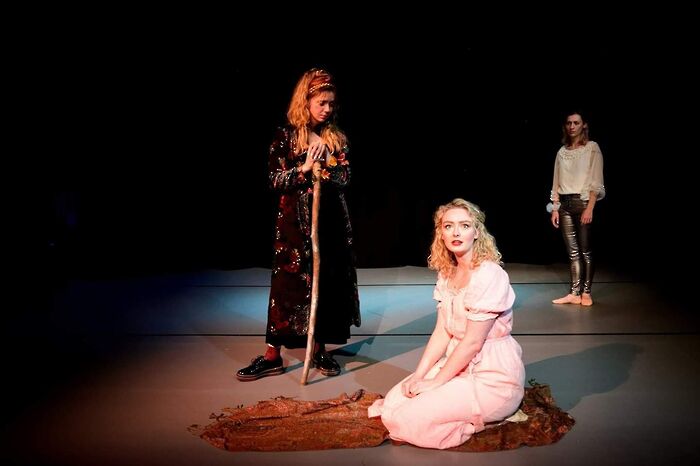Debauchery abounds in Issy Eardley-Snape’s treatment of Twelfth Night
This comedy is punchy and well-performed, but occasionally strays into over-stylisation

Billed as “perhaps, Shakespeare’s best comedy” in the production’s programme, Twelfth Night follows the journey of twins Viola and Sebastian when they are shipwrecked in the strange new land of Illyria. Viola disguises herself as a man and becomes a servant in Duke Orsino’s court, where she is tasked with wooing the fair Olivia on Orsino’s behalf. Much to Viola’s dismay, Olivia falls in love with Viola’s male persona, Cesario, while Viola herself pines after Orsino. When Sebastian arrives in the city, indistinguishable from his sister, chaotic instances of mistaken identity ensue. Supported by a farcical storyline about the servants of Olivia’s house, Twelfth Night guarantees comedy. Issy Eardley-Snape’s production, however, promises to bring the tragic elements of the play to light in an effort to blend these two seemingly incompatible genres.
A modern adaptation of Shakespeare is nothing new, but this production largely triumphs in its treatment of the setting. A well-choreographed movement sequence at the beginning of the play establishes the chaos of the busy city, and the original text of the play is interpreted well to fit this modern world. The set itself is ingenious: the design of Lucia Revel-Chion and Eardley-Snape makes good use of the ADC’s stage, complete with thoughtful set dressing. The standout piece is two boxes, walled with mesh, which descend and create rooms onstage before the audience’s eyes. Unfortunately, certain lighting states makes it hard to see through these boxes, reducing the emotional impact of some lovely moments between the actors. Dmitry Bashtanov’s lighting design is hit and miss: some choices, such as bright backlights, distracted from the action on stage, but other moments were beautifully framed. The greatest contributor to the tone of the piece, however, was undoubtedly Alice Chernaik’s skilful sound design and Aidan Tulloch’s composition. From punchy beats to unsettling soundscapes, the sound design complements the piece wonderfully and brings the setting together.
"This production’s crowning jewel, however, is its imaginative and original interpretation of the ending of the play, which arguably works even better than Shakespeare’s original"
The cityscape, however, sometimes strays too far into grittiness. While the use of colourful LED lights and electronic music works well, the debauchery of the characters occasionally becomes too extreme, even for the hedonistic city of Illyria. The audience does not see Orsino (Matthew Paul) sober until after the interval, and while this can be said to contribute to his character, it also arguably obscures his true character from the audience. Excessive drinking, repetitive drug use and smoking on stage (surprisingly, since it seems like a health and safety nightmare) serve to take the audience out of the action rather than contribute to it. The hedonism of the city could just as easily have been created with more subtle strokes – strokes that did not leave the auditorium stinking of cigarettes long after the scene was over.
Twelfth Night boasts a very strong cast, but it is the dynamics between these cast members that stand out. The romance between Viola (Georgia Vyvyan) and Paul’s Orsino is played beautifully throughout the production, both in Vyvyan’s compelling soliloquys and in the tense moments they share. Annabelle Haworth shines as Feste: the natural easiness of her character brings life to her scenes, especially those with Sir Toby (William Batty) and Sir Andrew (Ferdinand Holley). Batty and Holley also stand out as a hilarious comic duo. As promised, the production tackles moments of tragedy, but these are not as strong as its comedy. An exchange between Viola and Olivia (Ella Blackburn), although heartbreaking in the text, falls flat, while some later moments featuring Malvolia (Anna Wright) do not quite reach the heights of emotion needed to balance the comedy.
Despite minor hindrances, this production achieves a fresh perspective on Shakespeare’s original, which is no easy feat. The casting of Wright as a female Malvolia works well with the original text, raising questions about the silencing of women’s voices. The LGBT relationships are wonderfully and seamlessly incorporated into the production, and Vyvyan, Paul and Blackburn deal with the ambiguity of gender and sexual identity extremely well in their chaotic love triangle. The modern setting, however, leaves questions about Viola’s motivation for disguising herself as a man, which could have been examined further. This production’s crowning jewel, however, is its imaginative and original interpretation of the ending of the play, which arguably works even better than Shakespeare’s original.
Tackling perennial issues in a modern setting, Eardley-Snape’s production of Twelfth Night well deserves its place on the ADC main stage. Some production and performance issues prevent it reaching its full potential, but the unconventional ending goes a long way towards redeeming it. This production single-handedly proves that a modern adaptation of Shakespeare can be done well, and it can be fresh and exciting.
 Features / Cloudbusting: happy 10th birthday to the building you’ve never heard of30 March 2025
Features / Cloudbusting: happy 10th birthday to the building you’ve never heard of30 March 2025 News / Uni offers AI course for Lloyds employees30 March 2025
News / Uni offers AI course for Lloyds employees30 March 2025 News / Cambridge University Press criticises Meta’s ‘dismaying’ use of copyrighted material28 March 2025
News / Cambridge University Press criticises Meta’s ‘dismaying’ use of copyrighted material28 March 2025 News / Ski mask-wearing teens break into Caius accommodation27 March 2025
News / Ski mask-wearing teens break into Caius accommodation27 March 2025 Sport / Light Blues prevail in thrilling Varsity encounter29 March 2025
Sport / Light Blues prevail in thrilling Varsity encounter29 March 2025






